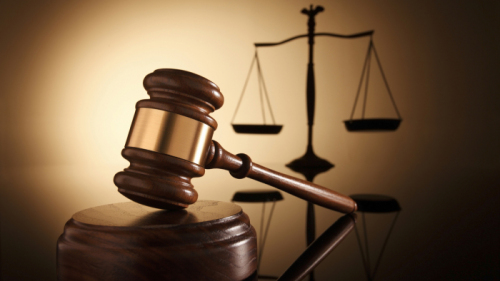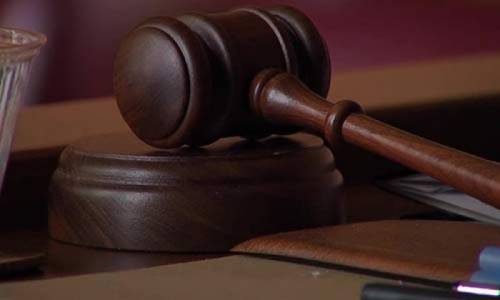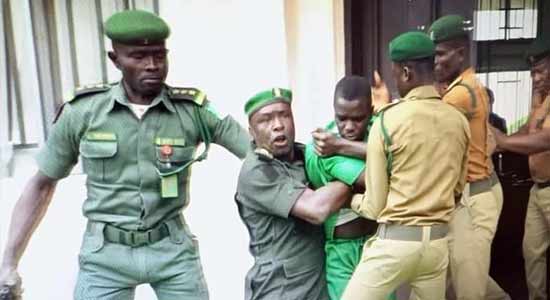COURTROOM NEWS 17/02/2022
Court Acquits Boko Haram Suspect, Says No Evidence Linking Him To Boko Haram Membership

The Federal High Court sitting Abuja, has on 4th of February, 2022 discharged and acquitted a man, Mohammed Gado, who was accused of being a member of Boko Haram.
The defendant was charged on a two-count amended charge contrary to Sections 8 and 16 of the Terrorism Prevention (Amendment) Act. Mohammed Gado, 37 years old man of Shagari Area Hadeija Local Government Area of Jigawa State was said to have had information that one Hashimu, his cousin was a member of Boko Haram but failed to disclose such information to any law enforcement or security officer as soon as reasonably practicable. You thereby committed an offence punishable under Section 8 (1) of the Terrorism Prevention (Amendment) Act, 2013.
He was also accused of professing to be a member of Boko Haram, which is an offence punishable under Section 16 (1) of the Terrorism Prevention (Amendment) Act, 2013.
During the trial the Prosecution in proof of its case called its witness, Detective Emmanuel Ayuba attached to SCID Maiduguri on special assignment at FCID Abuja who stated that the Defendant voluntarily gave his statement which was recorded in English and translated same to him in Hausa. On cross-examination, PW1 state that as at 10th September, 2015 Hashimu was a member of Boko Haram and the Defendant did not disclose.
The Defendant, Mohammed Gado, testified for himself as sole witness. He said he was arrested in the market where he sold fish. He does not know any Hashimu, Mohammed Danmiyi, Alh. Ali Nasaila. He does not listen to the preaching of Mohammed Yusuf. He stated that he is not a member of Boko Haram, he is a businessman. He has never told anybody anything about Boko Haram. He does not have any friend or relative who is a member of Boko Haram.
DW1 state that he has never rendered any help to Boko Haram. He saw Mr. Emma Ayuba in Kainji, he asked if he was Boko Haram and he said no. he thumb-printed Exhibit A, but did not know what was written there. He thumb-printed before it was read to him in Hausa.
In his final written Address, the Defence Counsel Ugochukwu Njoku argued that the court cannot convict a Defendant for a serious offence under the Terrorism Prevention Act solely on a retracted, uncorroborated, ambiguous statement made by the prosecution without following the laid down procedure for getting a confessional statement from the Defendant. He relied on the case of Chukwuogudo v. The State (2011) LPELR-860 SC where Per Muhammed Saifullahi Muntaka-Coomassie JSC (P.49-50, Paras. D-F) held thus:
“when a statement had been admitted as a confessional statement, and the accused later retracted it in his evidence, the court when considering the weight to be attached to it must consider the following:
- Is there anything outside the confession to show that it is true or real?
- Is it corroborated?
- Are the relevant statements made in it of fact, true as far as they can be tested?
- Was the prisoner who had the opportunity of committing the offence?
- Is his confession possible?
- Is it consistent with other facts?”
He submitted that this is the situation in the case at hand. The Defendant while giving evidence denied the confessional statement attributed to him by the prosecution and informed the court that he neither made such statement nor admitted to the offences charged in the information before the court. The court has a duty to tow the steps enumerated by the Supreme Court in Chukwuogudo v. The State (supra).
Counsel submitted that other than the confessional statement, there is nothing outside the confession to show that it is true. The Defendant protested and informed the arresting officer that he is not a member and has no connection to Boko Haram. This was not disputed by the prosecution. The prosecution gave no evidence of the arrest of the Defendant or any action of the Defendant or any other person that led to the arrest of the Defendant.
He contended that the burden of proof is always on the prosecution to prove the guilt of the Defendant in criminal trials Ogunleye Tobi v. The State (2019) LPELR-46537 (SC). The onus never shifts.
The contended vehemently that the Defendant in this suit is charged with having information that one Hashimu is a member of Boko Haram. However, the prosecution failed to lead evidence on who Hashimu is and how he is a member of Boko Haram or even whether at the point the Defendant had the information it was a crime to be a member of Boko Haram.
The counsel submits that the court has a duty to resolve any ambiguity or doubt in favour of the Defendant. the particular time and date the Defendant is accused of being a member of Boko Haram is an important element of the case. Boko Haram was proscribed on 24th May, 2013 by the Terrorism Prevention (Proscription Order) Notice, 2013, therefore being a member of Boko Haram before the 24th Mat, 2013 was not illegal in Nigeria.
The defence counsel also relied on the ruling of the court on Charge No. FHC/ABJ/383/2015 FRN V. NNAMDI KANU & ORS, where the court explained the point that a person cannot be convicted for being a member or pertaining in the activities of an organisation when the organisation has not been duly declared an unlawful organisation.
The prosecution relied on the written address of the Defendant and urged the court to convict him accordingly.
The Court agreed with the Defence counsel and discharged and acquitted the Defendant of all counts charged. The court described the Defendant as a witness of truth. According to the court, Boko Haram had not been proscribed as at the time the Defendant he was alleged to he a member.
“The above is now the position of the Defendant, and the whole. I have listened to the Defence of the Defendant, coupled with the observance of his demeanour, I am convinced that he is a witness of truth.
“As at the time he was alleging to belonging to Boko Haram, it had not been proscribed. The prosecution has the onus to prove all the ingredients of the offence and the only evidence they have before the court is the alleged confessional statement of the Defendant.” Justice Nyako held.
She added, “The Defendant in his defence led credible and believable evidence which the prosecution did not discredit and then relied on the Defendant’s written address which is to the effect that he did not participate in any Boko Haram activities.
“Premised on the above, I find and hold that the prosecution has not tied the Defendant with any of the offences charges, and consequently discharge and acquit him accordingly.”
As at the time of publication, we were informed by Defence Counsel, Ugochukwu Njoku that the defendant has not been released from prison custody despite his acquittal on all the counts charged. He said the continuous incarceration of the defendant is an abuse of his human rights and has promised to continue to provide pro-bono services to ensure such abuse is stopped.



